|
|
|
Sort Order |
|
|
|
Items / Page
|
|
|
|
|
|
|
| Srl | Item |
| 1 |
ID:
175536
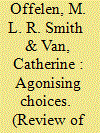

|
|
|
|
|
| Summary/Abstract |
Tragedy is one of the oldest metaphorical lenses of International Relations. The tragic vision of politics, from Thucydides to contemporary realist theorists, lies at the core of classical realism. However, it is striking how rarely the concept of tragedy has been applied to the discourse of humanitarian intervention. This lacuna is a weakness on both the intellectual and political levels, as nowhere are clashes between competing ethical perspectives more glaring. An examination of the concept of tragedy, as conceived from its Greek origins, can illuminate an understanding of the morally contradictory imperatives created by armed intervention. Using the Bosnian War as a case study, Greek classical tragedy provides a framework to grasp the agonising choices and insoluble ethical dilemmas brought about by humanitarian intervention, in contrast to mere narratives of salvation. The argument conveyed in this article seeks to reconcile a tragic vision with the idea of progress and political action. It concludes by suggesting that the fundamental lessons that lie at the heart of tragedy should be associated with another major concept in Greek culture, namely, the Aristotelian idea of phronesis or ‘practical wisdom’.
|
|
|
|
|
|
|
|
|
|
|
|
|
|
|
|
| 2 |
ID:
175533
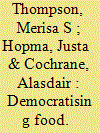

|
|
|
|
|
| Summary/Abstract |
Prevailing political and ethical approaches that have been used to both critique and propose alternatives to the existing food system are lacking. Although food security, food sovereignty, food justice, and food democracy all offer something important to our reflection on the global food system, none is adequate as an alternative to the status quo. This article analyses each in order to identify the prerequisites for such an alternative approach to food governance. These include a focus on goods like nutrition and health, equitable distribution, supporting livelihoods, environmental sustainability, and social justice. However, other goods, like the interests of non-human animals, are not presently represented. Moreover, incorporating all of these goods is incredibly demanding, and some are in tension. This raises the question of how each can be appropriately accommodated and balanced. The article proposes that this ought to be done through deliberative democratic processes that incorporate the interests of all relevant parties at the local, national, regional, and global levels. In other words, the article calls for a deliberative approach to the democratisation of food. It also proposes that one promising potential for incorporating the interests of all affected parties and addressing power imbalances lies in organising the scope and remit of deliberation around food type.
|
|
|
|
|
|
|
|
|
|
|
|
|
|
|
|
| 3 |
ID:
175535


|
|
|
|
|
| Summary/Abstract |
In this article, I argue that much of the discourse observable within the UN constitutes neither unnecessary and unproductive ‘talk’ nor efforts to convince outside audiences of its legitimacy, but actually a form of institutional self-legitimation that is key to its ability to function. Using the case of the UN's Department of Peacekeeping Operations (DPKO), I show that because the organisation has a multifaceted organisational identity, it faces situations where it is forced to choose between multiple but equally appropriate courses of action, and it uses self-legitimation alongside other mechanisms to overcome these tensions. I specify three sets of circumstances in which this occurs, showing how DPKO uses discourse that simplifies and exceptionalises in a bid to reconcile or downplay these contradictions and reassert a cohesive and legitimate organisational identity internally. This simplification and exceptionalisation in turn serve an enabling function, allowing DPKO to continue operating in conditions of complexity by decreasing risk aversion and instilling a deep sense of professional loyalty in staff. At the same time, such discursive processes are costly and may entrench inefficient practices, rendering the effects of self-legitimising discourse paradoxical: they may enable action, but they reduce the efficiency and effectiveness of that action.
|
|
|
|
|
|
|
|
|
|
|
|
|
|
|
|
| 4 |
ID:
175532
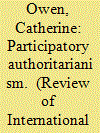

|
|
|
|
|
| Summary/Abstract |
This article explores the way in which Russian and Chinese governments have rearticulated global trends towards active citizenship and participatory governance, and integrated them into pre-existing illiberal political traditions. The concept of ‘participatory authoritarianism’ is proposed in order to capture the resulting practices of local governance that, on the one hand enable citizens to engage directly with local officials in the policy process, but limit, direct, and control civic participation on the other. The article explores the emergence of discourses of active citizenship at the national level and the accompanying legislative development of government-organised participatory mechanisms, demonstrating how the twin logics of openness and control, pluralism and monism, are built into their rationale and implementation. It argues that as state bureaucracies have integrated into international financial markets, so new participatory mechanisms have become more important for local governance as government agencies have lost the monopoly of information for effective policymaking. Practices of participatory authoritarianism enable governments to implement public sector reform while directing increased civic agency into non-threatening channels.
|
|
|
|
|
|
|
|
|
|
|
|
|
|
|
|
| 5 |
ID:
175534
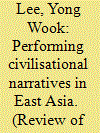

|
|
|
|
|
| Summary/Abstract |
This article aims to uncover the socially constructed normative foundation for the alternative East Asian economic development paradigm to neoliberalism in the context of civilisational politics. The question I seek to address is why East Asian states make value claims when promoting their alternative method of economic development. In addressing this question, I make two interrelated arguments. First, I argue that the politics of Asian values can be understood as another case of non-Western society's struggle to demonstrate multiple paths to modernity. Second, on a deeper level, I show that the discourse and narratives on Asian values is part of civilisation politics aimed to recalibrate the place of East Asia in a world consisting of the civilised and the uncivilised, a divide that still remains today in various forms following European expansion in the nineteenth century. In so doing, I shed light on the performative power of ‘the standard of civilisation’, which naturalises the temporal and sequential hierarchy of civilisational identities in world politics. On the basis of this article's findings, I draw out implications of a recalibrated East Asia for the ideas of hierarchy and progress in world politics.
|
|
|
|
|
|
|
|
|
|
|
|
|
|
|
|
| 6 |
ID:
175539
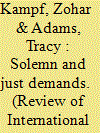

|
|
|
|
|
| Summary/Abstract |
Demands for apology are a prominent rhetorical means for pointing out transgressions in contemporary world politics. They transform ‘seen but unnoticed’ conduct into ‘seen and noticed’ transgression and attach a price tag to the restoration of damaged relations. Nevertheless, compared to the widely discussed practice of apologising, demands for apologies have received scant scholarly attention. In this article we adopt an actor-oriented perspective in order to situate the speech act of demanding an apology within the delicate management of interstate relations. In-depth content analysis of 57 cases of demands made by various state actors in a variety of diplomatic contexts between 1999 and 2019 let us delineate the discursive construction of transgressions, the normative scripts that inform acts of demands, the types of sought-after remedies, and their discursive consequences. We conclude by discussing the normative diplomatic scripts that guide demands for apology and how these speech acts reconfigure power relations in international politics.
|
|
|
|
|
|
|
|
|
|
|
|
|
|
|
|
| 7 |
ID:
175537


|
|
|
|
|
| Summary/Abstract |
As it has been written, the history of humanitarian intervention is all too Whiggish and all too white. By conceptualising humanitarian intervention in the way that they do, orthodox histories should be seen as entangled in debates about the origins of human rights but also, perhaps more crucially, debates about the various formations and reinventions of human rights. Alternative codifications of rights reveal the historical possibility of a Southern practice of what we would almost certainly call ‘humanitarian intervention’. The record of a radical Third World practice to save strangers from the atrocities of colonialism and extreme racism is also a record of Western states playing staunchly sovereigntist roles, of the West's late devotion to Westphalia. To sketch out such a counterhistory is to argue the following: at a threshold moment in the international-political life of the Responsibility to Protect, it is the terms, range, and domain of the intervention debate that must be re-formulated and re-evaluated.
|
|
|
|
|
|
|
|
|
|
|
|
|
|
|
|
| 8 |
ID:
175538
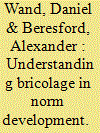

|
|
|
|
|
| Summary/Abstract |
Within international relations the normative agency of African actors is often downplayed or derided. This article develops the concept of bricolage to offer a novel understanding of norm development and contestation in international relations, including the role African actors play in this. We contend that a norm's core hypothesis can be thought of as the nucleus of a norm. In the case of complex international norms, if this core hypothesis is sufficiently vague and malleable, the norm will continue to attract a range of actors who may claim to share a commitment to enacting the core hypothesis even if they simultaneously promote a variety of potentially conflicting and contradictory meanings-in-use of the norm when doing so. Each meaning-in-use, we argue, might be thought of as a product of bricolage: a process of combining and adapting both new and second-hand materials, knowledges, values, and practices by an actor to address a problem in hand. Through a detailed study of the contestation of transitional justice between South Africa and the International Criminal Court, we elucidate how bricolage can help to illuminate the normative agency of African actors in shaping transitional justice. Processes of bricolage add complexity and potentially confusion to a norm's development, but bricolage also offers the potential for a creative and dynamic means by which a range of actors can inject pluralism, dexterity, and vitality into debates about a norm's meaning and operationalisation.
|
|
|
|
|
|
|
|
|
|
|
|
|
|
|
|
|
|
|
|
|